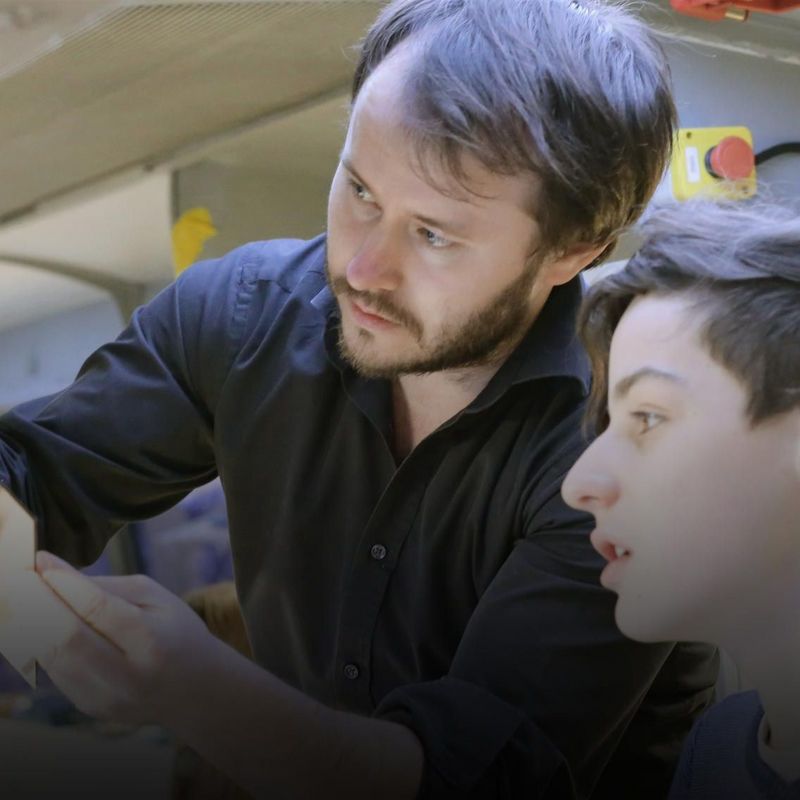09 August 2018
When their children play computer games, a lot of parents respond with anxiety and aversion. And yet, instead of flatly rejecting all computer games as evil, adults should take a serious look at their kids’ hobby so that they can arrive at their own judgements – this, at any rate, is the plea of Patricia Cammarata. She writes about children and digital media on her blog “Das Nuf Advanced“ and on the “Schau hin“ portal. In a workshop entitled “Endgegner Computerspiel“ (which translates as “The computer game as boss”) at the re:publica 2018 digital conference, she brought gamers and non-gamers together around a table.
Name:
Patricia Cammarata
Age:
42
Occupation:
Lecturer in business development
Website:
https://dasnuf.de // https://mkl.wtf/
What is “das Nuf”?
It started out as the nickname for a chat. In 2014 it turned into a blog and has since then also been published as a book. The main topic areas are children and digital media, privacy on the Net and equal rights. I discuss many of the issues with Caspar Clemens Mierau in a podcast entitled “Living with children“.
When it comes to computer games, many parents react with anything from bafflement to alarm. How do you think they should approach them?
Computer games are a hobby like any other. Depending on age, however, there are appropriate and less appropriate hobbies. For instance, I wouldn’t leave a five-year-old to bake a cake unattended. But if a sixteen-year-old wants to flambé marshmallows to decorate a cake, I don’t have an issue with that. The same thing is basically also true of computer games. As parents, you can’t avoid taking a closer look at games. Only then will you be able to make a judgement. A sensible approach would in any case be an unbiased and truly interested engagement with the issue. You also need to learn what the mechanics of the game are. Save points are an example here. If you say as a blanket rule in all circumstances that your child has to switch off after 30 minutes, but there’s no save point in that time, then you’ll be forcing them to give up what they’ve achieved so far and start from scratch the next time around. This is of course frustrating. It’s not as if I take the cake out of the oven after 30 minutes because that’s all the baking time I’m allowed!
“Shooter games” are a particularly red rag to many parents. Are their concerns justified?
No, not as a one-size-fits-all statement. I often find out when I talk to people that these games get demonised before parents have done more than gain a superficial impression of them. As soon as they hear shooting, the alarm bells start ringing, and meaningful discussion about the game is next to impossible. A really good example is the game Fortnite Battle Royale, which is incredibly popular with young people at the moment. Most parents know only that the aim is for 100 players to compete with one another to kill all the rest. Eliminating your enemies here is actually more like getting them in a game of tag. Most people don’t know that no violence is depicted in the game: you don’t even see blood, let alone dead bodies. But you would find out by spending no more than ten minutes actually watching the gameplay.
"I basically don’t think that blanket bans make sense."
Some parents use blanket bans as a preventive measure ...
I basically don’t think that blanket bans make sense. Older kids in particular will just play anyway - in secret. And if something does bother or concern them, to whom are they supposed to turn with their fears and worries? To their parents who’ve imposed a ban without even looking at the game beforehand? Only a handful of shooter games are actually primarily concerned with killing. In very many strategy games, weapons are part of the setting. But that isn’t necessarily what makes the game so fascinating. I once saw a presentation on strategies for Counter-Strike and was totally fascinated by how complex it is, how much the teams need to plan, and how many times they repeat moves until their strategy really works. As far as I could see, the killing was completely incidental, and my overall impression was that it was almost like a tactical sport. What’s more, I think people totally underestimate the capacity of kids and young people for abstraction and the extent to which they can distinguish between fiction and reality. I just don’t believe that there’s a direct correlation between shooter games and the potential for aggression.
One popular way of keeping gaming within bounds is to agree on time limits for media use. How have you agreed on these with your children?
We don’t have any fixed time limits. During the week, our kids have certain duties, like homework or helping out with chores, and then they have free time. In their free time, it’s up to them what they do. There are however some media-free periods: before school and in the two hours before bedtime. That doesn’t leave them much time at all to game (or to watch TV) during the week. At the weekend and in the holidays, what you might call excessive gaming can happen. During our winter holidays, my partner even games with the children. For me, it’s important for children to learn when it’s appropriate to play and when it isn’t. So far - touch wood - we’ve managed things really well.
"Offering alternatives can be quite useful - as long as they are attractive and credible."
Another piece of popular advice is to offer alternatives. And yet, encouraging a child playing computer games to kick a ball around instead is unlikely to go down very well ...
That’s a bit like offering a kid a cheese sandwich (even though cheese sandwiches can also be very delicious) when they’ve set their heart on Nutella. Offering alternatives can be quite useful - as long as they are attractive and credible. Shouldn’t your child be getting some exercise? Well, in that case, maybe the parent should get up off the sofa as well. Either that, or you talk more about it: What does your child enjoy? What options are there for making exercise a regular part of your everyday life? Geocaching and Pokémon Go also count as exercise in the fresh air. If I’m going to propose alternatives to computer games, I of course need to know what’s what and stay up to date. That can seem like hard work if you don’t play computer games yourself. But it takes less time than many parents realise. When it comes to buying a new toaster, a lot of adults will happily spend a couple of days doing research. To get a first impression of a game will in many cases take no longer than half an hour. I’ve written a step-by-step guide to this on my blog for Fortnite Battle Royale.
How can parents gain an impression of the games that their kids play or want to play?
Listen to podcasts or radio reviews. Watch “Let’s play” videos in which gamers document their experience. Go to online game advice sites. And, last but not least, just ask your child: What are you playing? Why do you like it? What exactly do you like about it? Sometimes I see that you’re getting really wound up - so why do you want to carry on playing? What are your friends interested in at the moment? Are you interested too? Why, or why not?
How do you cope when you’re not particularly enthusiastic about your child’s game - for instance, because it costs money for extras or the online version is set to run for eternity?
Unfortunately, there’s no substitute for having a really good chat about it. And you should do that as early as possible so that your kids are made as aware as possible of the issues before they first come up. If you’ve missed out on this opportunity, you will need to come up with other solutions. I myself find invitations to buy extras and adverts utterly exasperating. It was for this reason that we offered to get our kids a games console and contribute financially to the games, as these two problems are primarily associated with tablet and mobile gaming. We also researched into how easy it is to get hold of used games and how big the range is in our local library.
How can you cultivate media literacy in children?
The best way is to expose them to a media-literate environment in which they can try things out and talk about them. Absolutely not by imposing bans. It’s for these reasons that media literacy is an ongoing issue for parents.
Which digital product has yet to be invented?
I can’t think of anything off the top of my head. But I think we urgently need applications that are more data-sensitive and technologies for orderly and easy encryption.
And which products can you do without?
Spying devices like Alexa and the like. Although they are extremely tempting. After all, they’re simply so convenient ...
Which technical application will always remain something of a conundrum for you?
The 200 sub-programs of my microwave.
Which five apps are essential for you to get through the day?
OK, so it’s not so consistent to write about data minimisation and then immediately think of Google Maps. Life is full of contradictions. Otherwise, messenger services such as Threema, the reminder function on my phone, digital calendars and Wunderlist.
A holiday without Wi-Fi: Is that a dream or a nightmare?
Don’t need it.
Do you take your mobile to bed with you?
Yes, of course. But I don’t allow my kids to (see the point where I say “Life is full of contradictions”).
In the #explore format we’re giving a regular voice to exciting and inspiring people from the digital scene: to researchers, bloggers, start-up founders, entrepreneurs, hackers, and visionaries.


